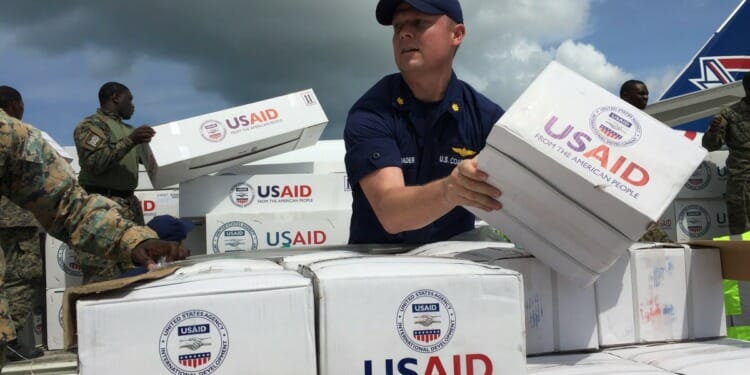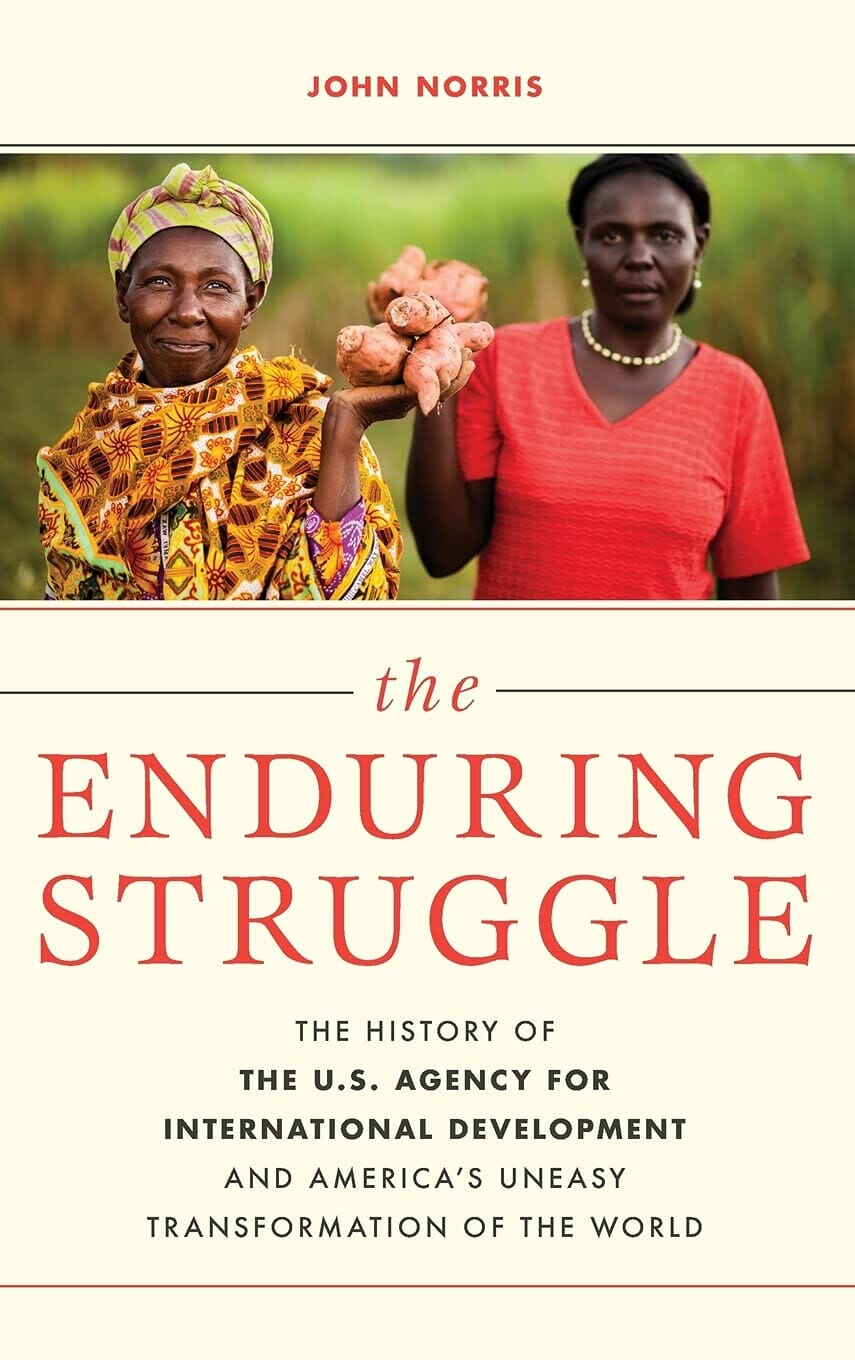Editor’s note: This is a review by two American foreign affairs experts of a just-published book by John Norris who served in President Obama’s Global Development Council and is currently working with the Bill and Melinda Gates Foundation. The book deals with US foreign aid, one of the most misunderstood functions of the U.S. federal government, with an outsized role in the political debate despite consuming less than 1% of the federal budget. Published July 1, 2021, on the eve of USAID’s 60th anniversary, it explores USAID’s impact, both successes and failures.
This is an important book for those who care about the world, and the role of the United States and the United Nations in our common future. Commissioned by the USAID Alumni Association which instructed the chosen author, John Norris, to produce an independent and unvarnished assessment of American foreign assistance, both good and bad. The book does this, and could not be more timely.
At this moment, the United States is deeply enmeshed in two unfolding disasters, namely Afghanistan and Haiti, both of which have long histories of U.S. foreign assistance and USAID engagement. U.S. leadership is being questioned and challenged at home and abroad, as is U.S. foreign assistance and in particular USAID. Given this backdrop, it is particularly fortunate that the current USAID Administrator, Samantha Power, is someone who is knowledgeable, and has broad experience and vision, including past service as U. S. Permanent Representative to the UN.
In the book, Norris documents key achievements of USAID, including its pivotal roles in generating, disseminating, applying and funding knowledge related to maternal and child health, including oral rehydration therapy (ORT), Vitamin A, breastfeeding, as well as breakthrough research in agriculture leading to the Green Revolution.
For some readers, the journalistic tone of Norris’ book will be seen as a strength. Missing was the more analytic approach of World Bank and UNDP publications, with graphs, charts, and boxed essays. That said, the book deals effectively, perceptively and extensively with USAID’s major core weaknesses and strengths.
One clear weakness is the unpredictability of USAID long term program funding. It is subject to the vagaries of the Congressional authorization and annual appropriations process. This presents a major constraint on client reliance, trust, and effectiveness. For example, while AID may develop five-year programs with countries or regions, each year these are “subject to the availability of funds from Congress”, sometimes with shorter-term Continuing Resolutions. From the recipient’s perspective, this uncertainty reinforces a natural tendency for developing country leaders to stress the immediate because they could not rely on U.S. multi-year commitments.
More broadly, Norris admits, at least implicitly, that U.S. foreign assistance has been dominated by domestic politics, domestic issues, and powerful economic interests. Indeed, “The Enduring Struggle” is replete with instances in which USAID has suffered repeatedly from being caught in the ups and downs of changing administrations and USAID Administrators. Beneficiary country perspectives have often been secondary.
In today’s world, one might ask: What are the costs today in continuing in this manner? What and when do others do better in garnering more trust? In the increasingly complex donor and geopolitical world of today, can the US do better in its foreign assistance?
The current disasters in Afghanistan and Haiti inevitably raise questions about the United States’ role, and more specifically, that of USAID, in ‘nation-building’– a concept that seems to have become so questionable in public discourse that it must be surrounded with quotation marks.
While much of the Norris book deals with nation-building in the broadest sense, it is striking that the term is not used in the manuscript and is not to be found in the Index. Yet the concept underlies the book’s title – ‘The Enduring Struggle,’ and its subtitle ‘America’s Uneasy Transformation of the World.’
Such language tends to overstate the matter, yet the idea cannot be avoided. Taiwan, the Republic of Korea, Senegal, and Ghana, must be seen as American success stories in nation-building, and in each case, USAID played an important role. But USAID was also present in Vietnam, Iraq, Afghanistan, and Egypt, overshadowed by military assistance and influence, to be sure. What is clear is that each country circumstance is different, but why the U.S. decides to intervene must be looked at in terms of past failures and successes and make hard judgments.
USAID started operations at the time of post-World War II independence of former colonies but long before the sweeping globalization of the late 20th century. Assumptions about what is needed, and presumptions, have changed over time. These will continue to change over time, but nation-building must be a continuing and responsible element of the United States’ long-term engagement, especially in politically, economically, and socially fragile countries, but also in the wider world.
Norris observes that the UN’s Millennium Development Goals (MDGs) were ‘transformative’; he picked up the term in the subtitle of his book, but hardly discusses the MDGs and the U.S. important role in them. He gives some attention to the current and much more ‘transformative’ Sustainable Development Goals (SDGs), and indeed, underscores the role of Obama Administration officials in their negotiation.
We wish Norris had given greater attention to the role USAID played in international organizations. USAID has and continues to provide significant influence, funding and guidance to the full raft of UN specialized bodies such as UNDP, UNICEF, WHO, WFP, UNHCR, UNFPA, and FAO. This has also been the case with respect to international financial institutions such as the World Bank, the regional development banks, and specialized funds, where the Treasury Department leads the U.S. Government but USAID is a very active and critical contributor.
Whether providing concepts, reviews, responses, or seconded personnel, USAID has also been a major contributor to the Organisation for Economic Cooperation and Development (OECD) and its Development Assistance Committee (DAC). Indeed, USAID played a major role in its foundation, and in encouraging other countries to institute development cooperation programs and join the DAC.
The Norris book is clearly an important contribution to the public dialogue on U.S. foreign assistance and foreign policy at a crucial time in our history.
Editor’s Note: The opinions expressed here by Impakter.com columnists are their own, not those of Impakter.com.— In the Featured Photo: Book distribution: USAID in conjunction with the Nigerian Educational Research and Development Council (NERDC) has launched the new Igbo and Yoruba early grade reading materials entitled Ka anyi gụo! and Jẹ ká kawe! (Let’s Read) for children in the Southwest and Southeast regions of the country. 3 February 2021 Source: USAID files Twitter photo











